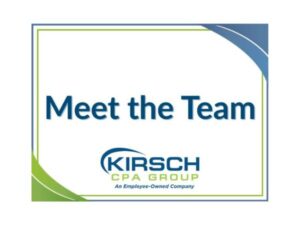Leveraging AI to Add Value to Your Business
Kirsch CPA Group
Oct 12, 2023

Artificial intelligence (AI) has been around for years. In November 2022, however, the technology became more broadly used by the general public with the advent of Chat Generative Pre-Trained Transformer (ChatGPT). This conversation bot uses AI to immediately respond to user prompts, simulating the ability of human beings to think and learn. “AI is our attempt at creating tech that mimics human cognition,” explains Sauvik Das, a professor at Carnegie Mellon University whose work focuses on AI and cybersecurity.
Although AI can be impressive in its ability to collate data and organize it into something resembling human thought, it can also be unreliable, at least so far. One aspect of ChatGPT and similar AI models is the tendency for it to incorrectly assign facts or to make up facts altogether if it can’t find any facts to support its assignment.
Put AI to Work for Your Business
With the caveat of “let the user beware,” businesses can use AI to make their operations more efficient and potentially more cost-effective. Here are some examples:
Personalized recommendations. Many e-commerce sites, such as Amazon, use AI to recommend products and services. Often these are based on a customer’s buying history, or the similarity of a customer’s buying history to that of other buyers.
Decision-making. AI can be used to parse data that may be too large for humans to analyze usefully. Examples include tallying survey responses from large groups and sifting through historical data to support decisions. The financial industry even uses AI to identify potentially fraudulent transactions.
Chatbots. Businesses can use software that imitates human conversation to respond to calls and website questions in a customer-friendly fashion.
Content marketing strategy. AI can analyze sales data to help devise marketing strategies, possibly matching customers to products and helping create strategies to reach those customers. For instance, Amazon and other retailers use AI to analyze selling trends in real-time, allowing them to tweak ineffective advertising messages and modify prices as needed.
Competitive intelligence. AI can help you better understand your competitors and your industry in ways that may add to your ability to be competitive.
Supply-chain enhancement. AI may be used to help with supply-chain issues. It can help predict the prices of materials and shipping, as well as identify efficient delivery routes or shipping approaches. It can even be used to find faster routes for drivers.
Price optimization. AI can more efficiently evaluate price history, brand reputation, competition, quality, seasonal changes, operating costs, demand and numerous other factors to help identify an optimal price point for your product or services. It can help you modify prices during different times of the year or by sales channel.
Disruptive Technologies
AI appears to be a major disruptive technology, similar to computers, cellphones and the internet. When those technologies first emerged on the scene, they affected numerous industries, eliminating some types of jobs while creating others.
Although AI could replace some jobs and processes, it’s more likely to become a tool to drive efficiencies; eliminate certain types of repetitive, menial work; and help businesses become more innovative. How these tools are used — by human beings — will be what drives innovation.
5 Best Practices for Using AI in Your Business
Artificial intelligence (AI) shouldn’t be a replacement for human thought and decision-making. Think of it as an advisor, not a final decision-maker. Here are five best practices for using AI in your business:
1. Start with the question, not the answer. That is, define the problem you’re trying to solve, bearing in mind that AI’s solution may not be the best choice.
2. Don’t equate AI with automation. Automation is typically a way of breaking a larger process into smaller parts that can be digitized and then aggregated into the value chain. AI can help create automation, but its greater potential in business is to help reimagine processes or experiences.
3. Remember: Reliable solutions require solid data. In some ways, AI systems appear to be getting less reliable, which might be attributable to the old saying, “garbage in, garbage out.” For example, if you’re asking AI to analyze a competitor, you should have confidence in the data it’s using to perform that analysis.
4. Use an ethical approach. The way AI uses a broad range of data and learns from that data — and certain aspects of its programming — has the potential to create ethical issues. This can include security breaches, unintentional bias and unethical use. To be most effective, digital ethics for AI are necessary in the original design of the technology, which the end-user may have no control over.
5. Use AI to enhance productivity. AI can help companies identify new combinations of existing technologies, which can improve productivity. It can also improve efficiencies by controlling manufacturing systems and by analyzing and modifying performance based on data.
The flip side is that these productivity gains may not be immediate (or successful). It’s important to realize the limits of AI and recognize that there aren’t any universal AI solutions. Depending on your company’s situation, some processes and decisions are better managed by experienced workers and better suited for existing technologies.
We can help you tackle business challenges like these – schedule an appointment today.
© Copyright 2023. All rights reserved.
More Resources

About The Author
Kirsch CPA Group is a full service CPA and business advisory firm helping businesses and organizations with accounting,…
Sign Up for Email Updates
Tags
Accounting & Financial News

Why Silence About Fraud Only Makes It Worse
Business owners generally experience a range of emotions — including anger, bewilderment and embarrassment — if fraud…




